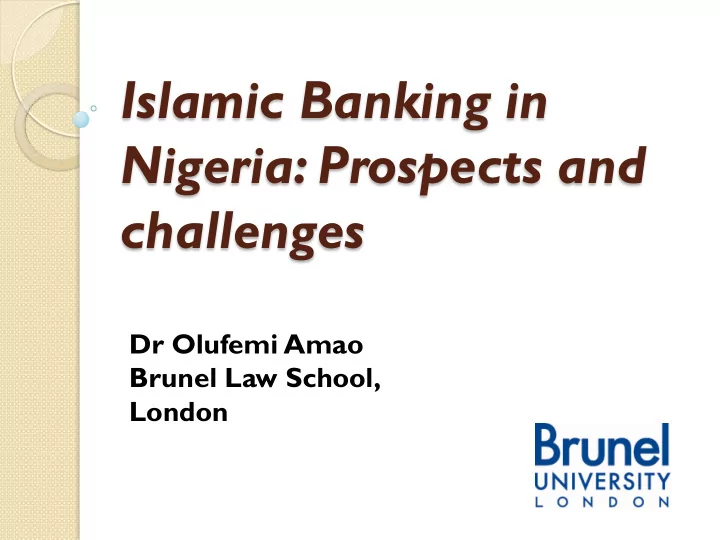

Islamic Banking in Nigeria: Prospects and challenges Dr Olufemi Amao Brunel Law School, London
The Context: Nigeria Nigeria is located in West Africa It has an estimated population of 140 million people It is estimated that half of the population consider themselves Muslims About 48.5% of the population consider themselves Christians About 1.4% follows other religions Muslims are predominant in the North and Christians are predominant in the South
Conventional Banking in Nigeria Colonial Origin: ◦ 1894: Establishment of Bank of British West Africa (later renamed Standard Bank and now First Bank of Nigeria Plc) ◦ 1899: Anglo-African Bank (later renamed Bank of Nigeria) ◦ 1917: Colonial Bank (became Barclays Bank in 1925 and later Union Bank of Nigeria) ◦ 1948: British and French Bank (now United Bank for Africa) 1914: Locally owned banks started operating
Background to Islamic Banking in Nigeria The Banking Act of 1969 ◦ Allowed for the establishment of “conventional banks” Repealed by Banks and other Financial institutions Act 1991(as amended) ◦ S61: Allow for establishment of profit and loss sharing (PLS) banking Bank which transacts investment or commercial banking business and maintains a profit and loss sharing accounts This seemingly accommodate ‘Islamic banking’ ◦ S21(1) exempts PLS from providing information relating to lending and deposit interest rates
T entative Steps to Islamic Banking T wo licences granted in 1992 Habib Bank (later named Bank PHB) offered a ‘non-interest banking window’ in 1999 2003: Jaiz Bank Plc
CBN 2010: Guidelines on Shariah Governance for Non- Interest Financial Institutions (NIFIs) in Nigeria A flawed approach ◦ Defined NIFI as ‘Islamic/Shariah’ banking leading to confusion ◦ State that all non-interest banking product must be Shariah compliant ◦ Insists that all NIFIs must establish a “Shariah Advisory Committee” ◦ The question of exclusion/discrimination
CBN 2011: Guidelines for the Regulation and Supervision of Institutions offering Non-Interest Financial Services in Nigeria A better approach Recognises the plurality of NIFIs ◦ NIFIs include but not limited to Islamic banking Expressly prohibits “discrimination on grounds of faith or ethnicity or any other grounds” (16.2) Allows conventional banks to operate Islamic banking window and/or subsidiary
Non-permissible Transactions ◦ Charging of interest ◦ Transactions involving uncertainty or ambiguity relating to the subject matter, terms and conditions ◦ Gambling ◦ Speculation ◦ Unjust enrichment ◦ Exploitation/unfair trade practices ◦ Dealings in pork, alcohol, arms and ammunition, pornography ◦ Other incompatible transactions
Relevance Large presence of Muslims in the country Social responsibility ◦ Large number of poor people Compliment conventional banking operations Potential to provide an alternative to conventional banking Open up the possibility of exploring other models of banking
Key Challenges Perception of non-Muslims Constitutional matters? The role of the CBN ◦ Grappling with limited success to supervise conventional banks Enabling legal framework Availability of adequate Shariah governance institutions: Supervision Availability of capital Profitability
Recommend
More recommend